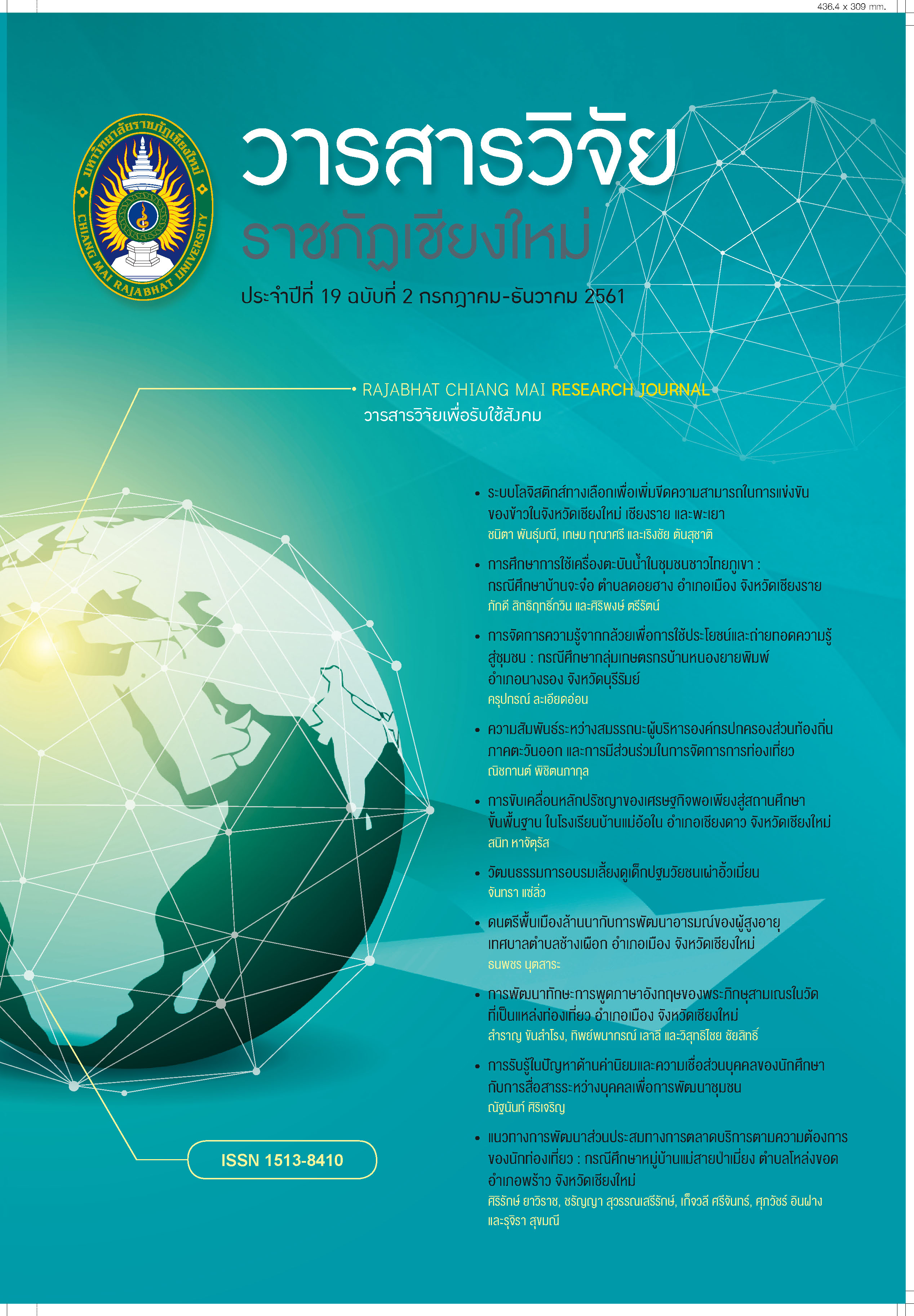Undergraduate Students’ Perceptions about Problems of Personal Values and Beliefs and their Impact on Interpersonal Communication for Community Development
DOI:
https://doi.org/10.14456/rcmrj.2018.150279Keywords:
Personal values, Personal beliefs, Interpersonal communication, Community developmentAbstract
The objectives of this research were 1) to survey the opinions of a group of sample undergraduate students on personal values and beliefs; 2) to analyze the relationship of the variable of gender with the impact of personal values and beliefs on community development; 3) to analyze the relationship of the variable of gender with the impact of interpersonal communication on community development; and 4) to form recommendations on how to solve problems related to personal values and beliefs that impact interpersonal communication and community development. The research method employed both qualitative and quantitative data collection methods, including a questionnaire and focus group discussions. The quantitative data showed that 18 of the samples (17.47%) placed the greatest importance on the value of thinking outside the box and creating differentiation. For personal beliefs, 14 of the samples (13.59%) gave the highest score to the belief that everything in life is not accidental and people have the agency to develop if they put in sincere effort. The following relationships were found to be statistically significant at .05 confidence level: the relationship of the variable of gender to the impact of personal values on community development had a chi square value .007 so the hypothesis was supported. The relationship of the variable of gender to the impact of personal beliefs on community development had a chi square value .091 so the hypothesis was rejected. The relationship of the variable of gender to the impact of interpersonal communication on community development had a chi square value = .001 and the hypothesis was upheld. Qualitative data from the group discussions indicated that the majority of samples strongly agreed that personal values and beliefs affect communication to develop relationships with other people and can have a positive impact on community development. They perceived that even if people began with differing values and beliefs, they could reach an agreement to better align their values and engage in friendly communication. This can create cooperation to prevent and solve problems in the community and to achieve effective community development.
Downloads
References
กมลชนก จันทร์แดง, ขวัญฤทัย บุญเนตร, นัฐพร อุตะมะและเพื่อน. (2561). ความเชื่อ. วิทยาลัยพยาบาลบรมราชชนนี นครลำปาง
ตระกูล ชำนาญ. (2561). การเปลี่ยนแปลงทางสังคมเศรษฐกิจที่ส่งผลกระทบกับวิถีชีวิตของชุมชนในจังหวัดเชียงใหม่. วารสารวิจัยราชภัฏเชียงใหม่, 19(1), 105-113.
นันทนา ขุนภักดี. (2530). การวิเคราะห์ความเชื่อของชายไทยในสวัสดิรักษา. พิมพ์ครั้งที่ 2. กรุงเทพมหานคร: มหาวิทยาลัยศิลปากร.
บ้านจอมยุทธ. (2561). ความเชื่อก่อนการนับถือพระพุทธศาสนา. สืบค้นจาก https://www.baanjomyut.com/library_2/extension-2/thai_philosophy/08.html
ปิ่นกนก วงศ์ปิ่นเพ็ชร์. (2558). ปัจจัยเชิงเหตุของพฤติกรรมสิ่งแวดล้อมของนักศึกษา ปริญญาตรีมหาวิทยาลัยภาครัฐในเขตกรุงเทพมหานคร. สุทธิปริทัศน์, 32(101), 121-133
พวงชมพู ไชยอาลา แสงรุ่งเรืองโรจน์. (2560). “กระบวนการสร้างพื้นที่สร้างสรรค์เพื่อสร้าง ความสัมพันธ์ระหว่างเยาวชนและผู้ใหญ่ผ่านภูมิปัญญาท้องถิ่น : กรณีศึกษา ชุมชนหมู่บ้าน หนองนาสร้าง อำเภอเมือง จังหวัดร้อยเอ็ด”. วารสารวิถีสังคมมนุษย์, 5(1), 166-190.
ฤทธิณัณฑ์ เชื้อทอง และรุจิระ โรจนประภายนต์. (2559). คณะภาษาและการสื่อสาร สถาบันบัณฑิตพัฒนบริหารศาสตร์. วารสารวิชาการ, 21(29), 110-143.
ฤทธิณัณฑ์ เชื้อทอง และรุจิระ โรจนประภายนต์. (2561). คณะภาษาและการสื่อสาร สถาบันบัณฑิตพัฒนบริหารศาสตร์ วาทวิพากษ์: ค่านิยม มายาคติ และอุดมการณ์ที่ปรากฏ ในหนังสือ “วรรคทองในวรรณคดีไทย” วารสารธรรมศาสตร์, 37(1), 19-42.
สมปราชญ์ อัมมะพันธุ์. (2536). ประเพณีและพิธีกรรมในวรรณคดีไทย. กรุงเทพมหานคร :โอเดียนสโตร์.
สุพัตรา สุภาพ. (2531). สังคมและวัฒนธรรมไทย ค่านิยม ครอบครัว ศาสนา ประเพณี. กรุงเทพฯ: ไทยวัฒนาพานิช.
สุพาณี สฤษฎ์วานิช. (2552). พฤติกรรมองค์การสมัยใหม่ แนวคิดและทฤษฎี. (พิมพ์ครั้งที่ 2). ปทุมธานี: มหาวิทยาลัยธรรมศาสตร์.
DeFleur, M. L., & Ball-Rokeach, S. (1982). Theories of mass communication (4th ed.). New York: Longman.
Miller, W. R. (1995). The ethics of motivational interviewing revisited. Behavioral and Cognitive Psychotherapy, 23, 345-348.
Phillips, H. P. (1965). Thai peasant personality: The patterning of interpersonal behavior in the village of Bang Chan. California: University of California Press.
Rokeach, M. (1973). The nature of human values. New York: Free Press.
Rojjanaprapayon, W. (1997). Communication patterns of Thai people in a non-Thai context. Doctoral dissertation Perdue University.
Schwartz, S. H. (2006). Basic human values: Theory, measurement, and applications. Revue française de sociologie.
Downloads
Published
How to Cite
Issue
Section
License
1. Articles, information, content, images, etc published in the “Community and Social Development Journal” are copyrighted by the Community and Social Development Journal, Chiang Mai Rajabhat University. In order to properly distribute the articles through print and electronic media, the authors still hold the copyright for the published articles under the Creative Commons Attribution (CC BY) license, which allows the re-distribution of the articles in other sources. References must be made to the articles in the journal. The authors are responsible for requesting permission to reproduce copyrighted content from other sources.
2. The content of the articles appearing in the journal is the direct responsibility of the article authors. The editorial board of the journal does not necessarily agree with or share any responsibility.














